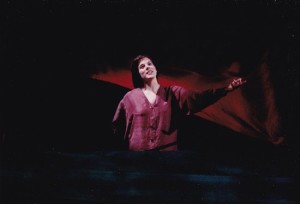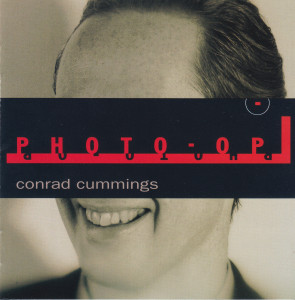Tonkin
Opera in Three Acts
Libretto by the Composer in association with Thomas Bird
Additional Material by Robert T. Jones
COMMISSIONED: by Opera Delaware
PREMIERE: November 1993, Grand Opera House, Wilmington DE
DURATION: 140 minutes
PUBLISHER: All Conrad Cummings works are self-published; contact him here
INSTRUMENTATION: orchestra of 35, 2 fl, 2 ob, 2 cl, 2 bsn, 2 hrn, 1 tpt, 1 trmb, 1 kbd, 2 perc, strings 55432
CAST OF CHARACTERS:
Trung Minh Chau, soprano
John Paul Scott, tenor
Ho Chi Minh, bass
J. Smith, mezzo
Solo Ensemble of Eight, SSMMTTBB
Chorus of Twelve SMTB
PREMIERE CAST:
Conductor, David Lawton
Director, Harry Silverstein
Trung, Peggy Kriha
Scott, Matthew Lord
Ho, Perry Ward
Smith, Kathryn Honan-Carter
Audio of OperaDelaware premiere production – Act I Finale (see note and lyrics below):
1945, Hanoi. Ho Chi Minh’s companions include John Paul Scott, the downed American flyer he rescued, and Trung Minh Chao, the idealistic Vietnamese teenager and member of his resistance forces. Ho has just declared independence from France. In the midst of the giddy celebration, J. Smith, the US State Department representative, delivers word that the US will support France’s colonial claim instead. All react in shock and anger; Ho prophesies the thirty years of war that will ensue, first against the French and then the Americans; Scott realizes he will have to fight the people who saved his life; Smith is caught between the message she must deliver and the situation she finds; and Trung insists that victory will be the outcome.
We’ll win
The path
Is straight
The goal
Is seen
In front
Our face
Can feel
Its heat
Our hand
Will grasp
Its neck
Our teeth
Will sink
And stop
Its breath
And hold
It fast!
The hand
Extends
In peace
Withdraws
Confused
You think
You know
Your friends
You’re doomed
With them
The world
Is new
The goal
Is green
The ghost
Revolts Returns
To haunt
The man
Who says
He owns
This nation’s
History!
It’s hard
Just how
Am I
Supposed
To turn
My back
And say
These friends
Who saved
My life
Are now
The ones
I have
To fight
I guess
That’s just
My job!
To think
That this
Is his-
tory
When all
I have
Is one
Word: No
And all
Will turn
And stop
And sink
Because
I said
The word
As I
Was told
Does this
Give me
The way
To own
This nation’s
History?
What happens when two nations with fundamentally opposing mythological pictures of their roles in the world come into conflict with each other? The opera spans the period 1945 to the present in the historical interaction between America and Vietnam, and interleaves and intermixes history with enactments of traditional Vietnamese and American fables.
Connecting events and fables are three lives: Ho Chi Minh, a professional revolutionary in 1945, John Paul Scott, a downed American flier he rescues and works with against the Japanese at the close of World War II, and Trung Minh Chau, a fourteen year old orphan whose spirit and idealism Ho sees as the hope for a new nation.
Scott will become a political advisor to the new South Vietnamese government in the 1950’s and general of the American forces in the 1960’s and 70’s. Trung will become Ho’s aide in the new North Vietnamese government, and will abandon him when responsibility for thousands of deaths in a failed agrarian reform program falls on his shoulders. She will join Scott in the Southern government, become disillusioned with the South in turn, and in desperation abandon her country. Ho will continue as the implacable leader of the fight against the Americans.
By the conclusion of the opera history and mythology have merged. Trung returns to Vietnam in the present day and meets the ghosts of Ho and Scott. She reconciles them to themselves and to each other, and calms their souls into repose.
—Conrad Cummings
Production photos from OperaDelaware’s 1993 production:
-

- Peggy Kriha Dye, Perry Ward, and cast (photo credit: Ted Sacher, Natural Photography, all images copyrighted: 1993, 2015)
-

- Perry Ward and cast (photo credit: Ted Sacher, Natural Photography, all images copyrighted: 1993, 2015)
-

- Perry Ward and cast (photo credit: Ted Sacher, Natural Photography, all images copyrighted: 1993, 2015)
-

- Matthew Lord and Peggy Kriha Dye (photo credit: Ted Sacher, Natural Photography, all images copyrighted: 1993, 2015)
-

- Perry Ward and Peggy Kriha Dye (photo credit: Ted Sacher, Natural Photography, all images copyrighted: 1993, 2015)
Act I complete audio:
Act II complete audio:
Act III complete audio:
THE WASHINGTON POST – JOSEPH McLELLAN
“. . . an emotional impact heightened by its sympathy for both sides.”
THE NEW YORK TIMES – JAMES OESTREICH
“Mr. Cummings samples musical history for techniques and sonorities the way rappers sample pop rhythms.”
THE WASHINGTON POST – JOSEPH McLELLAN
“ . . . a more complex view of war than any previous writer for the operatic stage.”
THE NEW YORK OBSERVER –





